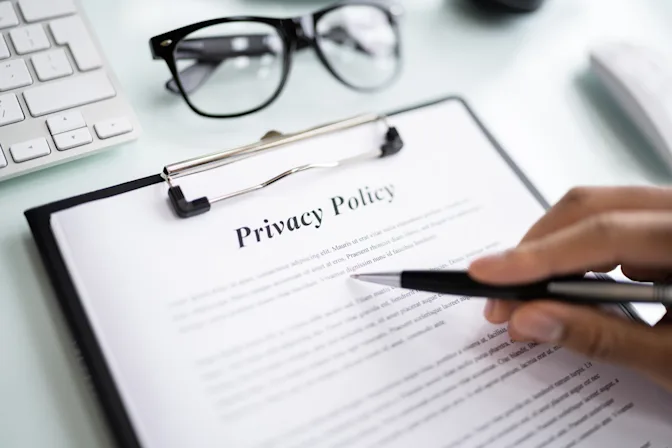
How to Shop Safely Online and Avoid Holiday Scams
Thanksgiving doesn't just kick off the holiday season — it's also the start of online shopping madness! With Black Friday and Cyber Monday hot on its heels, millions of shoppers will flock to the internet looking for deals. But while scoring the perfect discount can be exhilarating, it's easy to fall into the trap of a scam or unsafe website. So how can you tell if an online store is legit, especially when everything seems to be "50% off for a limited time?" Here's a guide to spotting safe websites before you click "add to cart."
1. Look for HTTPS in the URL
 Start with the address bar! If the website URL begins with "https" instead of "http," you're already on the right track. That little "s" stands for "secure," meaning the site is encrypted and your information (like credit card details) will be transmitted safely.
Start with the address bar! If the website URL begins with "https" instead of "http," you're already on the right track. That little "s" stands for "secure," meaning the site is encrypted and your information (like credit card details) will be transmitted safely.
Many browsers also display a padlock icon next to the URL — click it to verify that the site's SSL certificate is valid. As Norton advises, no padlock equals no purchase. It's an easy first step to avoid scam websites posing as legitimate stores.
2. Check for Contact Information
 A trustworthy website won't make it hard for customers to get in touch. Look for a phone number, physical address, and email address under the "Contact Us" or "About" sections. According to McAfee, if a store hides behind vague or missing contact info, that's a red flag.
A trustworthy website won't make it hard for customers to get in touch. Look for a phone number, physical address, and email address under the "Contact Us" or "About" sections. According to McAfee, if a store hides behind vague or missing contact info, that's a red flag.
When looking at the email contact, check to see if the email has the company domain name in it, or if it appears to be a generic email. It also helps to send an email to make sure it gets delivered.
3. Inspect the Website's Design and Content
 Scammers often create fake websites quickly, and it shows. If a site looks sloppy, loaded with typos, pixelated images, or weird formatting, it's best to steer clear. A safe website will have clear navigation, a professional design, and working links.
Scammers often create fake websites quickly, and it shows. If a site looks sloppy, loaded with typos, pixelated images, or weird formatting, it's best to steer clear. A safe website will have clear navigation, a professional design, and working links.
According to the SSL Store, broken links or outdated copyright information can also signal that the site isn't properly maintained — or could be a clone of a legitimate store designed to steal your personal information.
4. Read Reviews (But Be Smart About It)
 Customer reviews can tell you a lot about a store's legitimacy — if you know where to look. Stick to third-party review platforms like Trustpilot® or Google® Reviews rather than testimonials on the company's website (which can be easily faked).
Customer reviews can tell you a lot about a store's legitimacy — if you know where to look. Stick to third-party review platforms like Trustpilot® or Google® Reviews rather than testimonials on the company's website (which can be easily faked).
If the site has many 5-star reviews with vague or identical language, that's a red flag. On the other hand, too many complaints about non-delivery or poor customer service are a good reason to skip the store and find another retailer.
5. Beware of Deals That Seem Too Good to Be True
 Take a second look if it feels like a holiday miracle — a luxury item at 90% off or a price that's way below market. Scammers often lure people with "too-good-to-be-true" discounts to steal personal or financial information.
Take a second look if it feels like a holiday miracle — a luxury item at 90% off or a price that's way below market. Scammers often lure people with "too-good-to-be-true" discounts to steal personal or financial information.
A smart way to avoid this is to compare prices across multiple sites. If the discount is wildly different, it's probably a scam. Stick to reputable retailers with transparent pricing to avoid getting burned.
6. Check for a Privacy Policy
 Reputable online stores are required to disclose how they handle your personal information. Scroll to the site's footer to look for a Privacy Policy link.
Reputable online stores are required to disclose how they handle your personal information. Scroll to the site's footer to look for a Privacy Policy link.
If a website doesn't have one — or it looks suspiciously vague — that's a major warning sign. As McAfee points out, a transparent privacy policy is essential for protecting sensitive data during online transactions.
7. Use a Virtual Credit Card or PayPal®
 Credit cards and secure payment methods like PayPal offer extra layers of protection when shopping online. Many credit card companies will allow you to dispute fraudulent charges and may provide purchase protection.
Credit cards and secure payment methods like PayPal offer extra layers of protection when shopping online. Many credit card companies will allow you to dispute fraudulent charges and may provide purchase protection.
For even more security, consider using a virtual credit card number, which masks your actual credit card details. If the site you're shopping from doesn't accept secure payment methods and insists on wire transfers or gift cards — run the other way!
8. Trust Your Gut (and Your Browser's Warnings)
 Sometimes, your browser or antivirus software will detect a sketchy website and display a warning message. Take these alerts seriously — they can prevent you from falling victim to phishing schemes or malware. And if something about the website feels off, whether it's the layout, reviews, or checkout process—trust your instincts. You'll be better off finding a safer site to make your purchase.
Sometimes, your browser or antivirus software will detect a sketchy website and display a warning message. Take these alerts seriously — they can prevent you from falling victim to phishing schemes or malware. And if something about the website feels off, whether it's the layout, reviews, or checkout process—trust your instincts. You'll be better off finding a safer site to make your purchase.
Shop Smart This Holiday Season
Thanksgiving marks the beginning of the holiday shopping season, and with that comes the excitement of deals — and the risk of online scams. Whether you're shopping for Black Friday steals for yourself or checking off your holiday gift list early, stay safe by following these tips. Look for HTTPS encryption, review privacy policies, and avoid deals that seem too good to be true. When in doubt, stick to reputable retailers and trusted payment methods.
With some planning, you'll breeze through your online shopping this Thanksgiving season — without falling for scams. Now grab those deals and enjoy a stress-free holiday season!
References: 8 Ways to Know If Online Stores Are Safe and Legit | How to Check If a Website Is Safe to Buy From (And Prove Yours Is) | How to check if a website is safe: an 11-step guide























